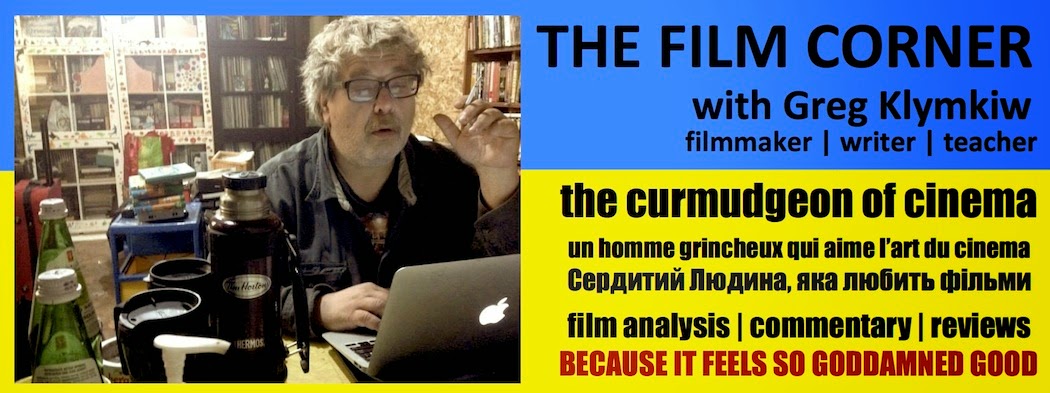Room (2016)
Dir. Lenny Abrahamson
Scr. Emma Donoghue
Starring: Brie Larson, Jacob Tremblay, Joan Allen, Tom McCamus, William H. Macy, Sean Bridgers, Wendy Crewson
Review By Greg Klymkiw
Lenny Abrahamson turned out to be the best director imaginable for this screen rendering of Emma Donoghue's novel of the same name. His last film Frank, created a wondrous, expansive world within the isolated confines of the country cottage wherein the title character's band creates music for a new album. Abrahamson then shifted us, ever-so deftly to a constrained, insular and painful emotional domain once Frank and company attend the SXSW music festival in Austin, Texas. Finally, we were plopped, alongside the film's characters onto the flat, open, limitless landscape under a big American sky, dwarfing, as it always does, everything and everyone.
Room shares a similar story structure to the aforementioned gem of a film. Like Donoghue's book, the first half of Abrahamson's new picture confines us to the tiny space that Ma (Brie Larson) and her 5-year-old son Jack (Jacob Tremblay) live in. Having been kidnapped and held hostage by Old Nick (Sean Bridgers), a sexual predator who has repeatedly raped Ma until she became pregnant with Jack, the isolated room of the title has been turned into a wide open world by Ma to keep her sanity, as well as that of her child.
Ma has used what meagre means she has at her disposal to educate her child. For example, every item in the room is ascribed qualities akin to humanity which not only describe said items, but allows Jack to offer salutations upon first laying eyes upon them every morning. Personification in fiction is one thing, but in real life, it's clearly quite another.
At the midway point of the picture, a harrowing escape delivers us into the world outside the room and in spite of the new expanse, Ma especially suffers as a free woman - her incarceration and the repeated sexual abuse (not to mention relentless media attention) has somehow dwarfed everything that could be seen as healthy and positive to her.
The two halves of the film are rendered with an astonishingly brilliant mise en scène, which indeed creates expanse in isolation and isolation in expanse. The first half, in spite of the one "room" setting, never really seems claustrophobic as the film roots the mother and son's relationship in a limitless love and deep imagination. Conversely (and not unlike Frank), freedom takes us to drearily grey exteriors and "normal" interiors that bear so much in common with everything that is so unbearably "normal" to anyone with huge imaginations (like Ma and Jacob).
Luckily, Abrahamson has the source material of Donoghue's novel to draw upon, as well as her screenplay adaptation. Oddly, Donoghue's screenwriting mostly eschews the novel's great "voice" (the story in the book is told by the five-year-old Jack) and Abrahamson must render it visually, without relying upon Jack's "voice" (except in tiny dollops). The lighting utilized in the room is especially evocative during daytime wherein the lone glimpse Ma and Jack have at the outside world is a small, dirty and unreachable skylight, casting a variety of eerie glows upon the proceedings. This genuinely great filmmaker pulls off the first half of the picture with flying colours, especially in the manner he blocks the movement within the interior of the "room", then eventually, outside of it - maintaining superb compositions to tell the story by cinematically capturing the evocative "voice" of the novel.
One other aspect which plays beautifully in the film is how it actually downplays the book's rather obvious allusions to the legend of Perseus. Donoghue makes use of an evocative epigraph of Simonides's (c. 556-468 BCE) poem "Lamentation of Danaë" which does help set the overall tone:
My childAlas, perhaps it sets the tone too well.
Such trouble I have
And you sleep, your heart is placid;
you dream in the joyless wood;
in the night nailed in bronze,
in the blue dark you lie still and shine.
It's difficult to read Donoghue's book without thinking heavily about the woman in the Simonides poem being both confined to a tiny space and unmoored upon unfamiliar waters, and, of course, Jack's brave actions during a harrowing escape sequence wherein, like Perseus, he essentially slays the gorgon Medusa - or rather, is responsible for the undoing of Old Nick. (In spite of the character's inherent evil, Abrahamson manages to do a great job of extracting a great performance from Bridgers which, in turn, adds a layer of humanity that far exceeds that of the book.)
Luckily for most audiences, the film subtly mutes Simonides. It's there if we want it, but I trust most eggheads will repress its use in the book once seeing the movie. And speaking of repression, one of the most moving aspects of the film is how Ma represses her pain rather than facing it. This is in direct contrast to her son Jack, whom she's sheltered from as much pain as possible so that he can hoover up every aspect of the great wide world. Ma's sacrifices and both Jack's support for his mother and his unyielding quest for knowledge are guaranteed to extract copious tears from even the most blinkered eyes.
Room is deeply moving, thanks to its evocative source material, an odd, but effective screenplay adaption by the novel's original author, to-die-for performances (especially Brie Larson as Ma) and Lenny Abrahamson's delicate direction. He's the real thing and then some. I suspect we're going to see many genuine masterpieces from Lenny Abrahamson over the next decade (or two, or three, or four, etc.).
Well, here's hoping, anyway.
Room is a Special Presentation at TIFF 2014 and is the lucky recipient of thr Grolsch People's Choice Award, and as such, will screen for free.


